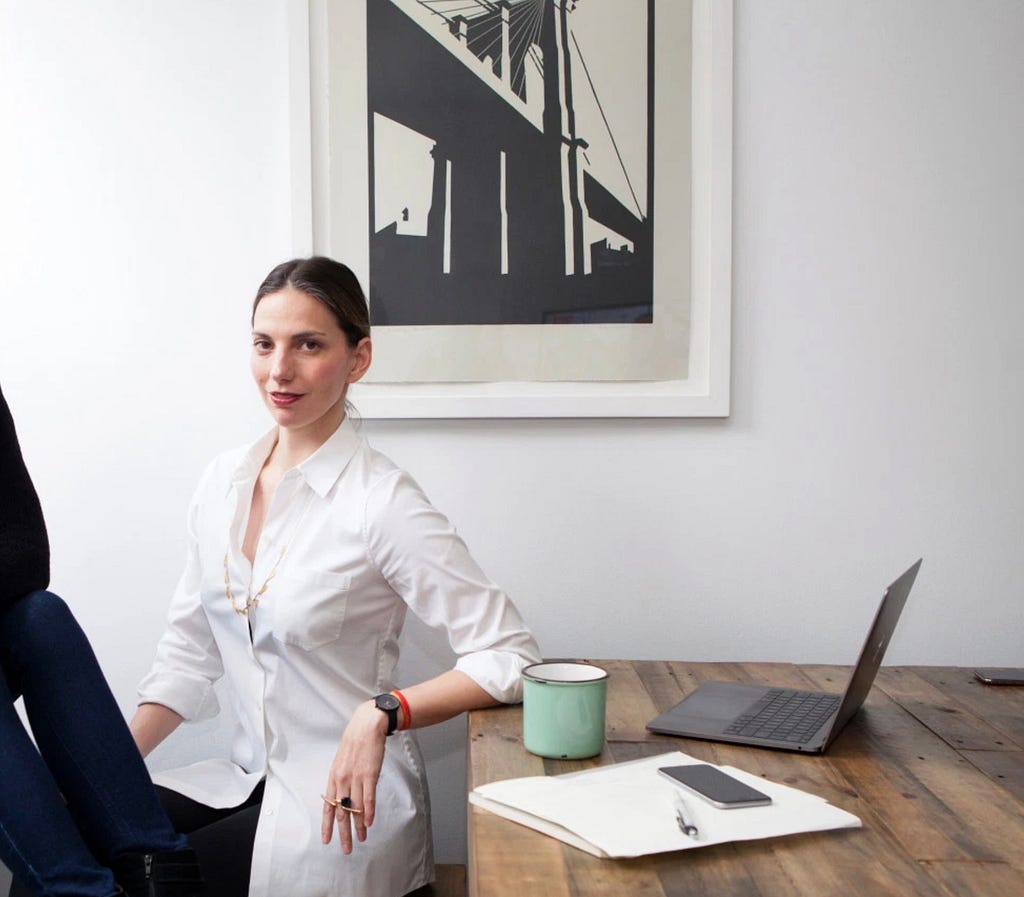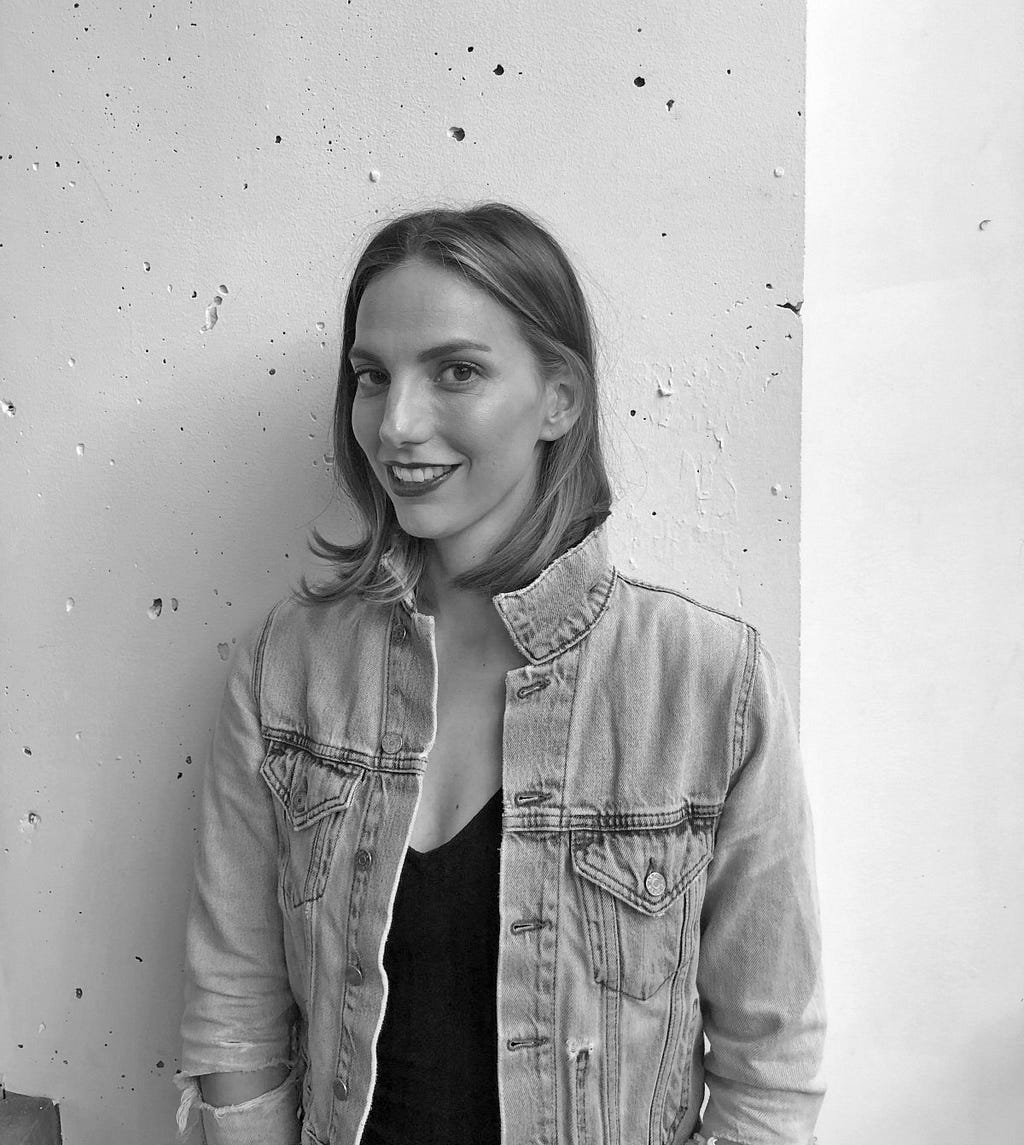
Be honest — Self-criticism is the hallmark of Imposter Syndrome, especially sweeping declarative insults that are patently untrue. For example, saying to yourself “You really suck at pitching ideas, and also your ideas are boring and just really bad, and you don’t deserve your job at all” is a dead-end, and therefore false. But if you choose to be honest and say, “I’m nervous about today because I don’t feel connected to this idea and I’m afraid my pitch is going to go badly,” you’ve just found the way forward, now you have options.
I had the pleasure of interviewing Mary Rinaldi. Mary is an NYC-based brand and product advisor helping organizations and individuals center their stories and products in user research, analysis and contextual thinking. After 10 years in finance and tech, she co-founded Simone to help people build power and agency in their careers. She spends her time mentoring and supporting under-represented creative thinkers and entrepreneurs and is in residence at NEW INC.
Thank you so much for joining us, Mary! Our readers would love to “get to know you” a bit better. Can you tell us a bit about your ‘backstory’?
Sure! I am a transplant New Yorker — I grew up in Beaverton, Oregon and moved to New York City after college in 2005. I moved to New York because of my parents’ stories. They told me all about their exploits and adventures in New York City as young artists — my father at SVA and my mother at the American Academy of Dramatic Arts. I think they meant for their recounting of life in New York to be a cautionary tale, but all I took away was the art and music, excitement and freedom that weaved throughout their lives here while they also struggled trying to make it in the Sixties and Seventies. They never did, honestly. But I dreamed about the artist’s life, and moved to New York to experience the magic of the city. I got a very dependable job as a paralegal at a respectable Midtown firm. After two years, bored out of my mind, I took a job at an investment firm, building hedge fund products for endowments, wealthy individuals and corporations around the world. I knew nothing about finance or banking but it was 2008 and I promptly learned pretty much everything you need to know about the free market — the rich get richer and the poor get poorer (unless you build and enforce thoughtful regulations and public policy). I left finance with quite a few successes under my belt and eventually landed in tech, excited to build products that democratized access to financial education and independence. You guessed it, more disillusionment. After the final straw of sexual harassment and gender discrimination, I got out, co-founded a company and now I work on what I want to — sustainable business ideas (Small is Beautiful, read it) and mentoring creative technologists at NEW INC.
Can you share with us the most interesting story from your career? Can you tell us what lessons or ‘take aways’ you learned from that?
I remember heading to Zurich for a week-long business trip in 2009 to brainstorm new business opportunities with colleagues across the UK and Europe. The company was looking for ways to pivot out of the old business model into a new, profitable one. Only a few years into the industry and six months in a new role, I was excited to be included, so I did my research and prepped to participate.
I learned quite a bit that week.
Most importantly it became clear we weren’t really there to design a new business plan, the whole exercise was about who was going to take power at the company now that the old money-making product line was defunct and assets under management had shrunk in half. Those of us who wanted to do the work and believed that collaboration with our colleagues would yield better results were not even in the same conversation.
That experience taught me that values drive everything, especially when the company experiences stress or a major downturn. If there are competing values, eventually the side with the most power and access to capital will win. I was super proud of how my manager, my team, and our sister team handled the 2008 crisis. We worked hard to be ethical and fair to our clients and our partners. But after that week I had a lower opinion of the company, and the industry as a whole. In theory finance and investing is supposed to be a pure place built on merit and numbers and math. But in reality, like every other business, it’s built on privilege and access. I learned how important it is to accept there’s no hidden good that you just can’t see in a place that feels unequal or inaccessible. Like Maya Angelou said, “When someone shows you who they are, believe them.” This holds true for companies too.
What do you think makes your company stand out? Can you share a story?
My company is in transition at the moment, but I’m really proud of the work my co-founder and I have done. We started Simone to explore solving the real problem of inequality and injustice at work. Employees have workplace rights but today companies are spending more time and resources managing risk than they do ensuring a safe and equal workplace. We wanted to change that by putting power and knowledge back in the hands of individuals through a concierge service of work guidance, connections to professional experts like executive coaches, employment lawyers and therapists, and a community of peers to people navigating their career. I’m proud of the success our clients had negotiating employment contracts, compensation, separation agreements and planning their next move with a sense of power and excitement.
We both continue this work personally, and I hope we’ll see more entrepreneurs working on expanding access and wellbeing in the workplace.

None of us are able to achieve success without some help along the way. Is there a particular person who you are grateful towards who helped get you to where you are? Can you share a story?
I learned about the power of sponsorship from my first female manager, Carla. I was nineteen and working at a multinational chemical distribution company. Carla promoted me to manage a team of five, and told me I was smart, capable, and the right person for the role. She saw a bright future for me and gave me the tools and opportunity to build it. Coming from an isolated childhood and not sure if I would ever attend university, my story might have been wildly different if she had not believed in me. I turned the opportunity she gave into another promotion a year later, negotiated for better pay and when the opportunity arose, left for university. She played a huge role in my belief that as a young woman I could do anything, and I am forever grateful to her.
Ok thank you for all that. Now let’s shift to the main focus of this interview. We would like to explore and flesh out the experience of Impostor Syndrome. How would you define Impostor Syndrome? What do people with Imposter Syndrome feel?
People with Imposter Syndrome feel a constant anxiety that despite repeated success and evidence of their competency, they are frauds. They feel a persistent anxiety that they’ll be caught out as imposters. It’s a very specific experience.
It’s been almost fifty years since clinical psychologists, Pauline Clance and Suzanne Imes, identified the condition and a lot has changed since.[1] As the stigma around mental health and wellness dissipates, the wealth gap continues to widen, and job security decreases, we’re all talking about Imposter Syndrome all the time, so I think it’s important to understand not only what it is, but also what it’s not:
- Imposter Syndrome is not just an anxiety about professional ability or knowledge. We all contend with insecurities and inherently understand (whether we admit it or not) that many talented people could do a better job than us with our opportunity. We are under no illusions in 2019 that merit alone brought us our success, but that we have arrived where we are through privilege and an inherent inequality in our economic and societal system. But, we are still individuals with a personal experience and so we feel we must fight for our brilliance, our skills, and our accomplishments, because if we have no story of individual excellence to tell, what do we have? This is debilitating, but it’s not Imposter Syndrome.
- Imposter Syndrome is also not the lack of self-worth or belief. Again, we go through discouragement, runs of bad luck, and unexpected challenges, which we can be tempted to interpret as a result of a character flaw or internal deficiency. It’s hard not to, since the vestiges of the American health and wealth gospel still crop up in our cultural storytelling — we’re taught progress is inevitable for those who truly believe in themselves. So what does it mean when we don’t progress? That we’re less worthy. Fighting this storyline is tough and essential, but it’s not Imposter Syndrome.
- Imposter Syndrome is also not the world removing opportunities from our grasp because of our gender, race, sexuality, age, body or a combination of any. Being punished for existing as ourselves is oppression. It is dehumanizing and violent, but it’s not Imposter Syndrome.
When we talk about Imposter Syndrome, it’s important that we don’t unintentionally misappropriate language for other real experiences, like those named above.
What are the downsides of Impostor Syndrome? How can it limit people?
Imposter syndrome is debilitating because it’s a constant experience. When you’re dealing with something unseen that requires mental and emotional energy to combat, the limitations can be heavy. Vulnerability drives learning — you can say “I don’t know” and ask questions with genuine interest. There is a battle going on internally and the solution to that battle is to learn and grow, but when you’re hampered by a crippling fear of being found out, the instinct is to be protective. It’s a vicious cycle.

How can the experience of Impostor Syndrome impact how one treats others?
Dealing with Imposter Syndrome can be a forcing function on self-acceptance and expand your ability to give other people warmth, space, and encouragement. Once you begin a journey to self-knowledge, what makes you feel good or bad and why, you’re on the path to self-acceptance. Sometimes, people who experience the most pain from Imposter Syndrome are the greatest source of healing for others.
We would love to hear your story about your experience with Impostor Syndrome. Would you be able to share that with us?
After building hedge fund products at an investment firm, one of our partners who I worked with closely on a successful project, wanted to hire me into their firm. This firm was one of the best — highly ethical and extremely well-respected. Even better, the team I was to join was run by one of the smartest, kindest women I met during my short career in finance. But, I was certain I would fail if I took the offer. I was fundamentally, fully afraid that without the pedigree (every single person there had attended The Wharton School of Business), the degree in economics (my degree was in literature and history), and a coveted CFA II certificate, I would last for a few months and then be fired. Looking back, I would have flourished. It was a perfect role for me — it combined my love of explicating structure and process (how the portfolio was built) and communicating outcomes (why the portfolio performed the way it did). But I didn’t take it.
Did you ever shake the feeling off? If yes, what have you done to mitigate it or eliminate it?
I don’t think people with Imposter Syndrome permanently eliminate the feeling, since it’s about alignment between your internal self and how you are perceived by the world. But I’ve found some tools to change the internal dialogue about that process. How we work — listening, teaching, and making — can be the best tool for that.
For example, I’ve accepted that I don’t pop up out of bed at 5:30 AM — that doesn’t mean I can’t make a habit of it and I have (for years). But I’ve learned that general productivity — clocking good hours at my job, meeting professional goals, and expanding my network isn’t really what I want. The grueling schedule required a level of anxiety that kept me from the work I really wanted to do. So now, I wake up around 8 AM, and I read or write for an hour with a freshly brewed cup of coffee. I arrive at my work for the day with clarity and intention — I now have multiple essays in progress, a few new roles I’m going after, and more warmth and generosity to offer others.
In your opinion, what are the 5 steps that someone who is experiencing Impostor Syndrome can take to move forward despite feeling like an “Impostor”? Please share a story or an example for each.
- Own the problem — The first step is stating that there is a problem, defining what it is without blaming anyone and then getting feedback. For me, this took the form of telling a close friend about my crippling anxiety and that I was done with it. She recommended a book for me to kick off the work and it was life-changing. Hot tip: read The Artist’s Way, it’s profound.
- Get into the world around you — Take walks, ride your bike, notice people, count oddities of nature, and notice the cracks in the sidewalk. While I was on a mission to overcome creative paralysis (brought on by Imposter Syndrome), I enrolled in a course called Drawing for Writers. I learned how to observe with attention, how to be present and found honesty and courage in my writing. Hands down, best class ever.
- Take your time — Luxuriate in the time it takes to change with no particular outcome other than feeling less anxiety about whether or not you’re worthy of your life, job or what you want. Time is elastic, so just go with it. Move quickly when you need to, move slowly when you need to. It will change your perception of the world.
- Be honest — Self-criticism is the hallmark of Imposter Syndrome, especially sweeping declarative insults that are patently untrue. For example, saying to yourself “You really suck at pitching ideas, and also your ideas are boring and just really bad, and you don’t deserve your job at all” is a dead-end, and therefore false. But if you choose to be honest and say, “I’m nervous about today because I don’t feel connected to this idea and I’m afraid my pitch is going to go badly,” you’ve just found the way forward, now you have options. You might have a teammate help you out with the pitch, or interrogate what you feel is missing from the idea. Or you may accept that this one may not go your way and take some rest and refreshment.
- Be disciplined — Practice, practice, practice! As you find time throughout your week to do all these things, ritualize them. Changing the conversation is an ongoing practice. You will experience setbacks and anxious moments, and how you respond to them will have a big impact on the steadiness of your outlook. Healthy emotional and mental grooves help us persist through difficulty.
You are a person of great influence. If you could inspire a movement that would bring the most amount of good to the greatest amount of people, what would that be? You never know what your idea can trigger. 🙂
I’d like to see a movement of living in peace with each other. A movement of non-violence for the sake of non-violence. I see violence in most of our structures. It’s used to govern who can move freely, who can vote, who can have a living wage, who can have bodily autonomy, who can express opinions, and the list goes on. This kind of violence needs to end. Today protests go on because governments and societies are unwilling to end the violence that powers systems of inequality. And so people protest and take a stand for autonomy, for freedom, respect and peace.
If we could pass different laws, build different governing systems — ones that are non-punitive, inclusive and respectful, with a universal code of ethics members agree to live by, perhaps we could actually work together to heal our species, our ecosystems and our planet.
That is my deepest hope.

We are blessed that some very prominent leaders read this column. Is there a person in the world, or in the US, with whom you would love to have a private breakfast or lunch, and why? He or she might just see this, especially if we tag them 🙂
I’m not a scientist, but I believe that we would build a more compassionate, sustainable way of life if we understood ourselves as part of the Earth, not masters of it, just one species among many with a responsibility to help others. Jane Goodall’s work to build that possible future is beautiful and inspiring. I would love to have lunch with her and ask how her work could translate to sustainable diplomacy structures to help the aggrieved and aggriever resolve disputes and conflict.
How can our readers follow you on social media?
I’m on Twitter at @soulcarousel, and I write a newsletter called PSST — it’s a cheeky but serious weekly compendium of work tips, advice and cool stuff people are doing in their careers. I am focusing on people who have deep wisdom to share, and who are also considered “ordinary.” They may not be the next unicorn or have a sexy title, but they make life and work a joy — people are, after all, all we’ve got.
This was very inspiring. Thank you so much for joining us!
Mary Rinaldi: “How I Was Able To Thrive Despite First Experiencing Impostor Syndrome” was originally published in Authority Magazine on Medium, where people are continuing the conversation by highlighting and responding to this story.

